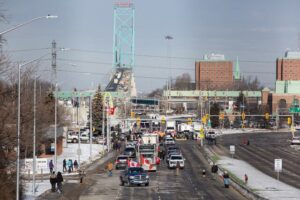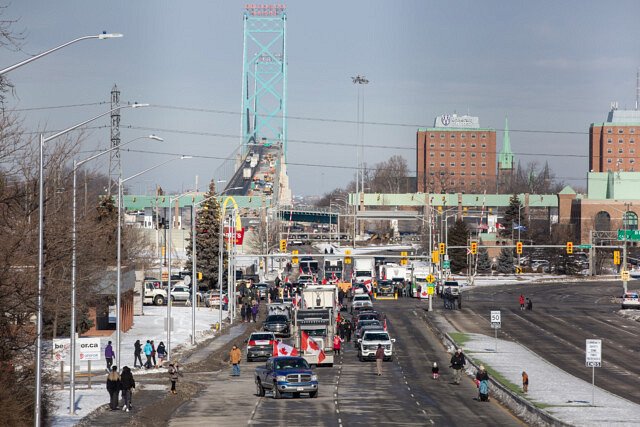Freedom Convoy, the protest does not stop

TORONTO – The Freedom Convoy protests, which started in Canada from Ottawa, are spreading like wildfire in 34 countries around the world including the United States, the United Kingdom, Germany, France, Argentina, Austria, Cyprus, New Zealand, Australia. The capital of Canada, where truck drivers arrived in large numbers on January 29, continues to be besieged by a hundred protesters. Today, shouting “Freedom!” and “Fake news!” a group of trucks reached Ottawa International Airport causing traffic disruptions and delays.
The protests, which have led to at least 23 arrests and 80 criminal investigations in the capital – where the state of emergency remains in place – are sparking debate among officials on how to bring the situation back to normal both in the city and at the US-Canada border crossings, where truck drivers have disrupted the flow of goods and people.
Today, Ottawa police warned protesters blocking roads that they could be “arrested without a warrant.” “It is a criminal offense to hinder, disrupt or interfere with the lawful use, enjoyment or operation of property, those who take part in criminal activities – which could include blocking roads or ‘assisting others in blocking roads’ – could be arrested and if convicted, their vehicles could be seized and eventually confiscated,” police said.
Canadian Prime Minister Justin Trudeau, who has been widely targeted by protesters, called the obstruction of border crossings “an economic crisis.” Roadblocks, he said, “endanger jobs, impede trade, threaten the economy and hinder our communities.” Business groups and experts have reported that blockades at border hotspots are damaging supply chains. Goods worth about $300 million pass through the Ambassador Bridge every day.
Meanwhile, the demonstrations of truck drivers – to which no vax and no mask groups have been added since their inception – continue to clog the communication routes between the United States and Canada.
Today, two major entry points — the Ambassador Bridge connecting Detroit to Windsor, Ontario, and Coutts connecting Montana to Alberta — were closed or partially blocked. The transit point to Manitoba — Emerson in North Dakota — was also closed after a convoy of agricultural vehicles and equipment blocked traffic to both north and south.
In addition, two of the world’s largest automakers – Ford and Toyota – have had to stop production at their factories blocked by truck drivers. Stellantis, owner of Chrysler, was forced to reduce shifts due to a shortage of car parts. “We are in court to obtain an injunction to have Ambassador Bridge lift the blockade,” Automotive Parts Manufacturers’ Association president Flavio Volpe told the Corriere Canadese.
Michigan Governor Gretchen Whitmer called on Canada’s provincial and national governments to stop the protest that is harming “Michigan worker families who are just trying to do their jobs” and stressed that “the Ambassador Bridge is the busiest land border crossing in North America.”
In a post on TikTok , Freedom Convoy co-organizer Chris Barber announced that the convoy will reach Toronto over the weekend. “Toronto, get ready. It will be epic. All these trucks will be heading towards you,” is Barber’s somewhat disturbing message. And in Toronto, the police closed Queen’s Park Circle as a precaution.



